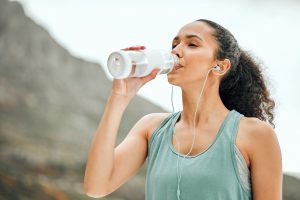Want Healthier Joints and More Energy? Try Drinking More Water

You probably know that drinking water is good for you. It makes your skin look healthy, helps flush out toxins, and assists with weight loss. It even helps your body lubricate your joints for increased movement and flexibility. In simpler terms, drinking more water helps keep bones from rubbing together, and less friction means healthier joints.
Staying hydrated could have a much larger impact on your health. Just as a coolant leak can cause an engine to overheat, not drinking enough water can cause your body to overheat. If you don’t drink enough water, you may become dehydrated, which can affect your mood and lead to constipation and kidney stones.
You can get enough water from beverages and foods to avoid dehydration and its undesirable effects. So, how much water is enough? You’ve probably heard of the 8×8 rule, which calls for drinking eight 8-ounce glasses of water daily. That’s easy to remember, but the truth is that everyone has different hydration needs. Knowing the signs of dehydration and some basic facts can help you determine when and how to increase your water intake.
8×8 rule: Fact or fiction?
About 50 to 70% of your body is made up of water. Think of the human body as a giant watermelon composed of mostly water. That means we must replenish water to survive when we lose water. How much water you need depends on your age, health, the climate, and how active you are. No evidence supports the 8×8 rule, but experts recommend 15.5 cups (3.7 liters) and 11.5 cups (2.7 liters) of fluids a day for men and women, respectively, including fluids from foods. As a general rule, listen to your body and let thirst guide your intake.
So, what are the signs of dehydration?
First, it’s important to understand how your body loses water throughout the day. Water loss can happen when we breathe, sweat, cry, and urinate. When we lose more than we drink, we can get dehydrated. Feeling thirsty is your first sign that you could be dehydrated. Drip lips or a dry mouth and feeling tired or lightheaded can also signal that you’re not drinking enough liquids. If you pass urine less frequently than usual, or your urine is dark with a strong smell, you may need to increase your fluid intake.
To flavor or not? Make it fun, but watch out for sweetened drinks.
No one said drinking water has to be dreadful. You can get as creative as you want if you’re not particularly fond of the taste. You can try squeezing a lemon or lime into your water or make flavored ice cubes with fruit juice or other natural ingredients. Water is water, so do what works for you; just be mindful of flavor enhancers that may be loaded with too much sugar. It’s best to spice up your water with strawberries, cucumbers, or mint for an enhanced taste. Low-calorie coconut water and sparkling water are excellent choices to consider, too.
The water vs. sports drinks debate.
Calorie-free water that you can drink at home for free with or between meals should be your beverage of choice to hydrate. Sports drinks are popular and appropriate for athletes and most adults after long, intense workouts. If you exercise heavily for longer than an hour, consider replenishing the minerals you may have lost; sports drinks can help with that. But sports drinks are inappropriate for daily hydration or to drink with meals. Instead, opt for water or low-calorie fluids, including low-fat or fat-free milk.
Energy and sports drinks should be off-limits for children and adolescents. Energy drinks, for instance, have high caffeine concentrations and other stimulants inappropriate for children. And sports drinks have too much sugar. Not as much sugar as colas or other sweetened beverages, but enough to raise concerns about obesity and cavity risks. In general, plain water is better for your daily hydration needs. Water from fruits and vegetables can also count toward your daily fluid intake. Add watermelon, cantaloupe, cucumbers, zucchini, spinach, and peaches to your diet.
The bottom line.
We need water to survive, so pay attention to the most common signs of dehydration, such as dry lips, dark urine, and thirst. Each person’s needs and circumstances are different. If you’re dehydrated after being sick or having diarrhea, you may need an oral rehydration solution. Call your CHI St. Vincent primary care provider to make an appointment for questions or concerns about your daily water intake.
Sources:




